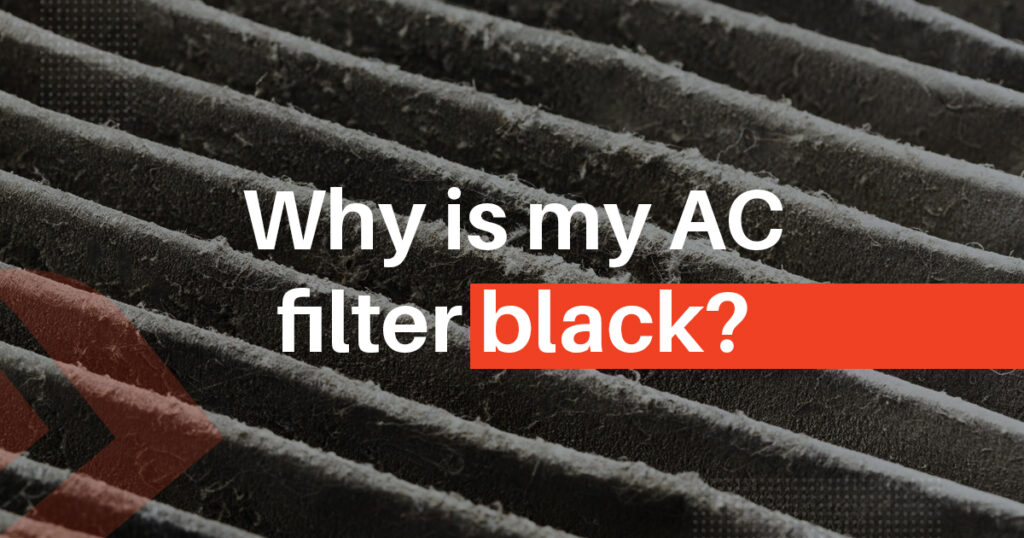All filters are made in the USA – Order Today

If your home has an HVAC system, it’s best to replace the air filter every month. In one of those check-ups, you may notice regular dust buildup. However, if your AC filter is entirely black, that’s never a good season.
A black AC filter can be caused by soot, mold, or clogs. When left unattended, it can lead to bigger issues in your HVAC system, requiring costly repairs and replacements. Unfortunately, none of these problems can be fixed without the help of a professional HVAC technician, but you can prevent them.
Keep reading to learn why your AC filter is black and how to prevent each of the three causes.
Your air filter can turn black due to soot buildup, mold growth, and a clogged HVAC system.
Soot is the most common cause of a black air filter, and it works pretty rapidly to clog up your AC. It mainly comes from your gas water heater or candles around the house.
If you constantly have candles burning in your home, their smoke can create soot buildup in your air filters and reduce their efficiency. But, of course, giving up candles entirely is impractical, so you can prevent soot buildup by trimming the candle wick each time you light it.
If you have a propane water heater in your home, it could also be the reason your AC filter is turning black. A blue flame in your gas water heater indicates a clean burn, while others produce smoke. A flickering flame can also contribute to soot buildup in your air filter.
Here’s how you can prevent soot buildup in your AC filters:
Black soot is bad for your AC filter, but mold is much worse. Mold may grow on your AC filter or within your AC system due to condensation collecting on the evaporator coil. In ideal conditions, this moisture should drain the drain pipe or into the drip pan.
However, if any of those parts are cracked or clogged, the condensation goes to the air filter. A wet air filter creates an ideal environment for mold to grow, especially during humid days.
If your AC filter has mold, it’s crucial to replace it immediately and call a professional to ensure there’s no mold growth elsewhere in your home. Aside from being unhygienic and smelly, mold can be detrimental to your health. It may cause issues like pneumonitis, fungal sinusitis, asthma, etc.
Mold in your AC filter is a problem that requires immediate attention, so make sure to call your HVAC technician right away. They will inspect your HVAC system to ensure mold hasn’t grown to other AC parts.
Here’s how you can prevent mold from growing in your AC filter:
If you’ve checked your air filter for soot or mold and found none, you may be dealing with a clogged air filter. A clogged AC filter will lead to restricted airflow, which hinders the air quality within your home and damages your HVAC system simultaneously.
Plus, it will do a poor job of effectively stopping pollutants from infiltrating your home’s air quality. As a result, you and your family may be breathing in pet dander and other pollutants. At the same time, a clogged air filter can ruin the performance of your HVAC system.
The clog prevents air from smoothly passing through your AC system, which causes it to run longer and ensures that your home reaches the desired temperature. Not only will this strain your HVAC system, but it will also raise your electricity bills.
Here’s how you can prevent your AC filter from getting clogged:
Now that you know what’s causing your AC filter to turn black, you can fix the issue with its dedicated solution. Plus, you can take certain preventive measures to ensure it doesn’t happen again, as these problems can wear down your HVAC system unnecessarily and lead to failure.
If none of the above-mentioned issues are the reason behind your AC filter turning black, you can contact your HVAC technician to guide you.
Have any questions? We’re here and ready to help!
© 2022 Custom Filters Direct. All rights reserved.